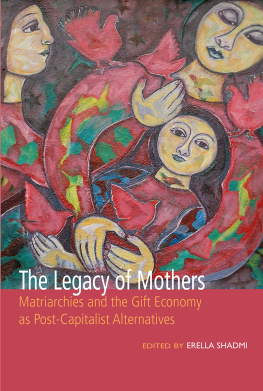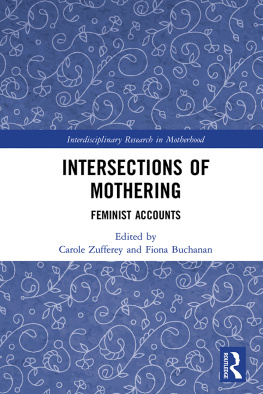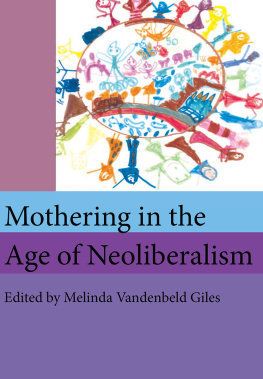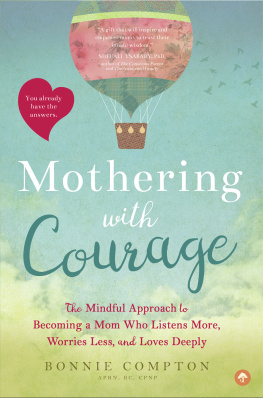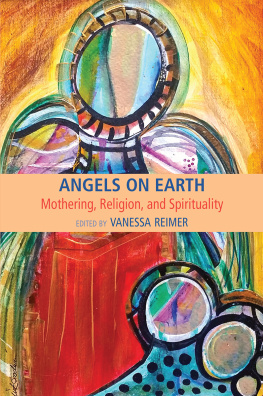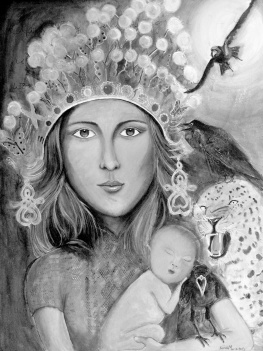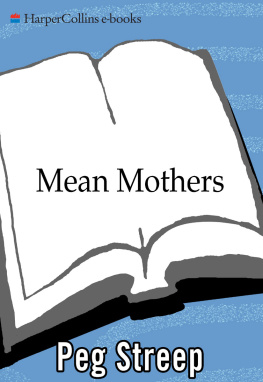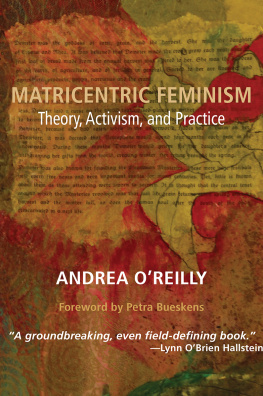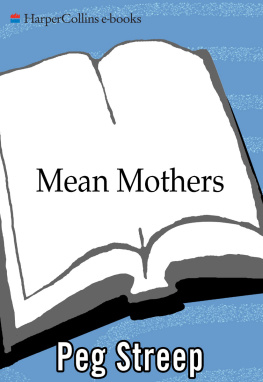The Legacy of Mothers
The Legacy of Mothers
Matriarchies and the Gift Economy as Post-Capitalist Alternatives
EDITED BY
Erella Shadmi
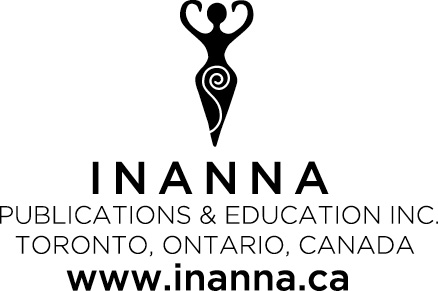
Copyright 2021 Erella Shadmi
Except for the use of short passages for review purposes, no part of this book may be reproduced, in part or in whole, or transmitted in any form or by any means, electronically or mechanically, including photocopying, recording, or any information or storage retrieval system,without prior permission in writing from the publisher or a licence from the Canadian Copyright Collective Agency (Access Copyright).

We gratefully acknowledge the support of the Canada Council for the Arts and the Ontario Arts Council for our publishing program. We also acknowledge the financial support of the Government of Canada.
Note from the publisher: Care has been taken to trace the ownership of copyright material used in this book. The author and the publisher welcome any information enabling them to rectify any references or credits in subsequent editions.
Front cover design: Val Fullard
Cover Image: Shirley McDaniel, Constancy (2018). Acrylic on canvas, 79 cm x 76 cm. Shirley McDaniel, 2018. All rights reserved. http://www.art-explorations.com .
eBook: tikaebooks.com
Library and Archives Canada Cataloguing in Publication
Title: The legacy of mothers : matriarchies and the gift economy as post-capitalist alternatives / edited by Erella Shadmi.
Names: Shadmi, Erella, editor.
Description: Includes bibliographical references.
Identifiers: Canadiana (print) 2019015778X | Canadiana (ebook) 20190157836 | ISBN 9781771337090 (softcover) | ISBN 9781771337106 (EPUB) | ISBN 9781771337113 (Kindle) | ISBN 9781771337120 (PDF)
Subjects: LCSH: Feminist economics. | LCSH: Capitalism. | LCSH: Matriarchy. | LCSH: Motherhood Social aspects. | LCSH: MotherhoodPolitical aspects. | LCSH: Feminist theory.
Classification: LCC HQ1381 .L44 2021 | DDC 305.4201dc23
Printed and Bound in Canada.
Published in Canada by
Inanna Publications and Education Inc.
210 Founders College, York University
4700 Keele Street, Toronto, Ontario M3J 1P3
Telephone: (416) 736-5356 Fax (416) 736-5765
Email:
Dedicated to my mother Ruth Shadmi (Roza Shlezing).
May she rest in peace. Her love is with me until this very day.
Contents
Introduction: MotherhoodBetween Chaos, Malfunction, Magic, and Vision
ERELLA SHADMI
U ncertainty, chaos, conflicts , dilemmas, maternal thinking, unlimited giving, our mirrors, the source of life, the source of anger, the source of mental complications and pain, bliss, powerthese are but a few of the common descriptions given to motherhood in the Western world. Motherhood awakens many moral and philosophical questions: what is life, what is creation, empowerment, responsibility, meaning of life, common sense and feeling, good and bad, morality and immorality? The mother figure is with us all our lives. Writers, poets, and artists tell about her, depict her, and fantasize about her. Satirists parade her conflicts and failures, philosophers, sociologists, psychologists, and doctors mould and interpret her with endless theories. Women share their experiences as mothersbut still, no one has ever managed to encompass the very complex definition of motherhood, and no one person has a proper answer to the question of the essence of motherhood and what is right and worthy motherhood. Finally, it remains a tangled mystery, a maze that moves between magicthe magic of mystery, creation, nurture, love, giving, the experience of togetherness and othernessand the disillusion of magicmothering, the failures, the guilt, the difficulties, the pain, its institutionalization, its nationalization. Motherhood is uncontrollable and indefinable. The secret of proper motherhood (how, for what purpose, for how long, etc.) remains and evokes the contemplation that maybe the search for proper motherhood is mistaken and reflects distrust in mothers themselves. This search and its hopelessness attest to the complexity and richness of motherhood and the impossibility of fully grasping it (which is why there is no bible for mothers, despite the constant attempts of Dr. Spock and others). Thus it remains flexible, ever-changing, challenged and challengingdefiant, exceptional, and ordinary.
Nonetheless, many try to control motherhood and use it for their own purposes: patriarchy, capitalism, religion, the state, the welfare system, politics, medicine. Mothers are blamed for almost everything, especially their sons and daughters behaviour, i.e., almost any social misconduct. As a result, their sons and daughters tend to blame them as well and do their best to stay as far away from them as possible (an act that socially, culturally, and patriarchally is encouraged). All those who claim to know what motherhood is and how we, the mothers, are to be moulded create a disconnect between the mother and motherhood, distancing the mother from other mothers and of course from her children, undermining her confidence, cutting her off from her heritage and inclinations, and, in fact, leaving her alone in the face of giant institutions.
Despite everything, mothers usually do a good job; most of their children function well. Most mothers find their way through the maze of raising children and develop the necessary skills for the work of motheringsuch as multi-tasking, maternal thinking, nurturing their children and themselvesdespite all the attempts to control them. A woman is like natureshe simply learns from those surrounding her: her mother, her sisters, aunts, and friends. Mainly, however, she learns from her children by responding to their needs. Her road is strewn with trial and error, wonderment and learning, doubts and changing. Most mothers try to fulfill their childrens needs even if they feel trapped in their role or are ambivalent about it. Like other mature women who become mothers themselves, as time has passed, I admit that my mother did her best when raising me, despite mistakes she made. I wish I could be the mother and daughter I am today (to raise my daughter and regard my mother with my present understanding and wisdom). It is obviously not possible, but my motherhood and my mothers motherhood were certainly not failures.
It is not surprising that mothers are usually invisible, and therefore few are the studies, if any, that directly examine their success in raising their childrenif any criterion for such a study may be formulated at allexcept, perhaps, by comparisons, for example, between only children and children with siblings. In other words, offsprings achievements in education, employment, social skills, and so on are often comparatively examined. However, these achievements are usually not framed as the mothers success. On the other hand, the focus is turned on the mothers when failure is apparent, such as a juvenile delinquenta youth who steals, murders, rapes, or one who commits suicide following the abuse of his or her peers. That is when we all look to the mother: Who raised them to be such monsters? True, there are attempts to define and test parental efficacy, mainly by psychologists for the courts in cases of divorce or a child removed from the home. In fact, no society has developed tools for the assessment and measurement of parental efficacy in the general populationall the more so of motherswhen the assumption is that parental efficacy exists in every adult (Yagil). Furthermore, not only are these measures of parental efficacy doubtful (Almagor and Erlich), they are intertwined with problematic legal rhetoric (Barkay; Barkay and Mass) and bureaucratic violence (Hertzog). Therefore, the claim that parental efficacywhich includes the mothers efficacyis measurable seems like another way, albeit legal, to define motherhood and control it, and is usually applied to mothers coming from a specific ethnic or social background (and is not necessarily for the benefit of the child).

